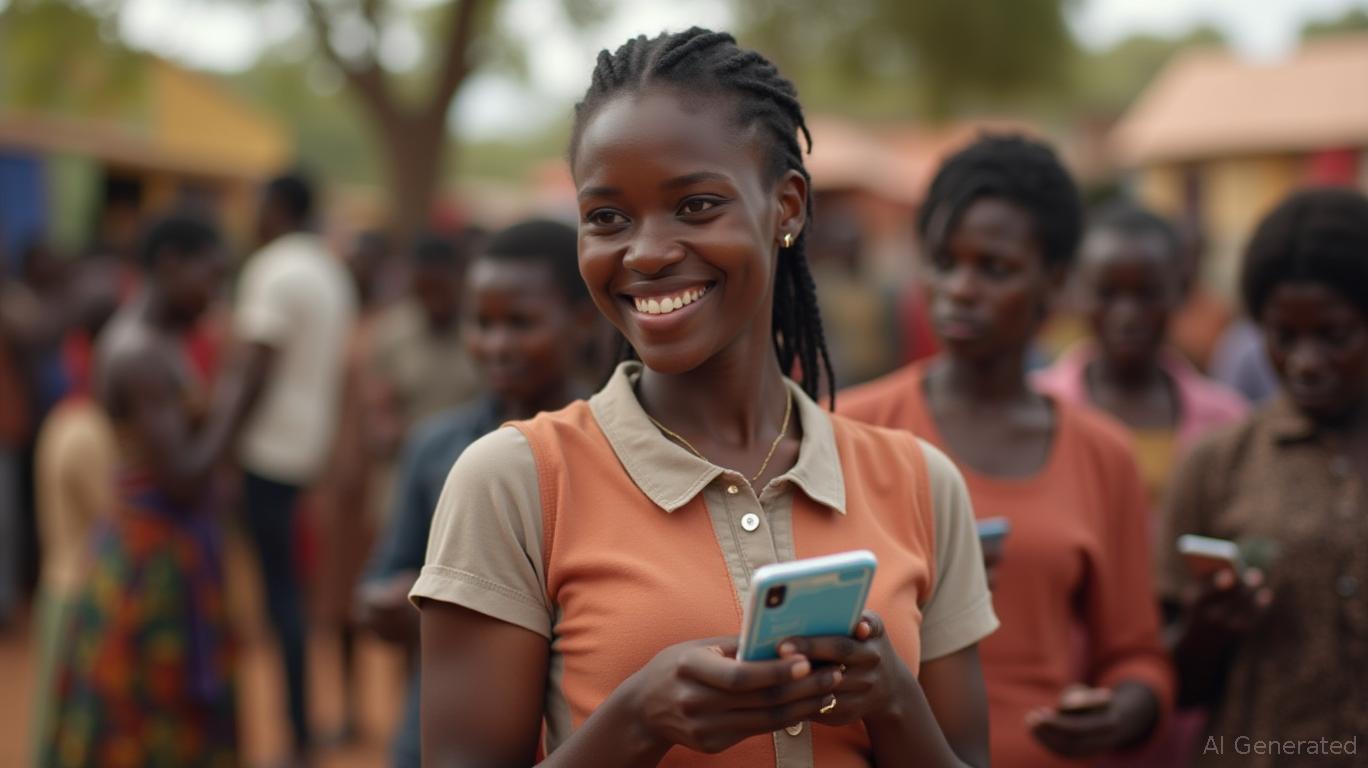Smartphones Become Essential: M-KOPA Reaches 1 Million Users in Uganda, Tackling Financial Barriers
- M-KOPA reaches 1 million Ugandan customers via 7,484 DSRs, expanding digital inclusion through pay-as-you-go smartphones and loans. - The platform's "More than a Phone" initiative bundles financial tools, targeting 173,000+ users with loans, insurance, and mobile data in rural/urban areas. - With 83% of Ugandan DSRs under 35, M-KOPA aims to scale to 10 million smartphones by 2027, positioning devices as lifelines against financial exclusion across five African nations.
M-KOPA, a fintech firm based in the UK, has reached a major milestone in Uganda by serving its one millionth customer in the country. This accomplishment, made possible through the efforts of 7,484 direct sales representatives (DSRs), highlights the company's dedication to promoting digital and financial access throughout Africa. Announced in a LinkedIn update on November 4, 2025, this achievement represents a crucial advancement in M-KOPA’s mission to reach underserved populations with affordable smartphone financing and digital financial products, according to a
M-KOPA’s progress in Uganda is part of its larger goal to reduce the digital gap across Africa. Utilizing a pay-as-you-go approach, the company offers smartphones, solar energy solutions, and other vital technologies to households with low and moderate incomes. In Uganda, 83% of the DSRs are under the age of 35, demonstrating the company’s commitment to empowering young people to promote technology adoption in both rural and urban communities. Sales representatives such as Emmanuel Habyarimana, who has enrolled over 3,000 clients, and Elisezi Ndugala, a leading agent with nine years of experience, illustrate the local impact of M-KOPA’s strategy, the report highlights.

In addition to selling smartphones, M-KOPA has broadened its services to include digital lending, now providing financial products to over 173,000 users. Through its Smart Money Platform, customers can access loans to help manage their finances, strengthen their economic stability, and support small business growth. The platform also offers health insurance, mobile data, and device protection, turning smartphones into versatile tools for economic advancement. In Uganda, the introduction of the "More than a Phone" campaign further enriches this ecosystem by integrating features like digital loans and health coverage into a single device, as detailed in the report.
M-KOPA’s expansion in Uganda is part of its wider growth across Africa. The company is active in five countries—Kenya, Uganda, Nigeria, Ghana, and South Africa—and has set bold objectives for 2025 and beyond. It plans to exceed $500 million in yearly revenue by the end of the year and ramp up smartphone production to 10 million units by 2027. Company leaders have stressed that smartphones are not just tools for communication, but essential resources for overcoming financial exclusion, especially in rural regions, the report notes.
This achievement demonstrates M-KOPA’s capacity to respond to market demands while using technology to create positive social change. As the company continues to grow, its business model may become a reference point for other fintech organizations aiming to tackle Africa’s distinct financial inclusion issues.
Disclaimer: The content of this article solely reflects the author's opinion and does not represent the platform in any capacity. This article is not intended to serve as a reference for making investment decisions.
You may also like
IREN's $9.7B Artificial Intelligence Agreement and Profit Jump Fail to Prevent 12% Share Decline
- IREN shares fell 12.37% despite $9.7B Microsoft AI cloud contract and record $240. 3M Q1 revenue, driven by Bitcoin-to-AI pivot. - $384.6M net income turnaround and $662.7M EBITDA highlight transition to vertically integrated AI infrastructure with 3GW renewable-powered data centers. - 140,000 GPU deployment and $1.8B cash reserves contrast with investor concerns over $1B convertible notes, execution risks, and contract dependency. - Microsoft's 10% capacity access with 20% prepayment ($1.9B annualized)

Kazakhstan's Push for Digital Independence: Crypto Reserves Seek to Broaden Oil-Driven Economy
- Kazakhstan plans a $500M–$1B crypto reserve fund by 2026, managed by AIFC, to diversify its oil-dependent economy. - The fund will invest in crypto ETFs and companies, using seized digital assets and state mining proceeds, avoiding direct crypto holdings. - International partnerships (e.g., Cove Capital, Nvidia) and gold/foreign currency allocations aim to build tech infrastructure and attract investment. - Critics highlight risks around transparency and volatility, while the initiative aligns with globa
LUNA Plunges 80.61% Over the Past Year as Market Fluctuations and Technical Weakness Persist
- LUNA fell 0.74% in 24 hours, with 14.1% weekly and 13.92% monthly declines, reflecting sustained bearish pressure. - Technical indicators like RSI and MACD confirm bearish momentum, with key support levels breached and moving averages underscoring the downtrend. - Backtesting shows limited short-term recovery after 10%+ drops, with weak statistical significance and high outcome dispersion. - Analysts warn LUNA remains in a long-term bear market, lacking bullish catalysts and facing continued downside ris
COAI Token Fraud Aftermath and Cryptocurrency Research: Managing Uncertainty in an Unstable Market
- The 2025 crypto market faces a paradox: innovation coexists with rampant fraud, exemplified by the COAI Token scam linked to centralized manipulation and false AI claims. - COAI's 70% price surge masked 87.9% supply control by ten wallets, mirroring scams like MYX Finance, while Meta's platforms face scrutiny for enabling $15B daily scam ad traffic. - Investors now prioritize due diligence tools like triple-audited projects (XRP Tundra) and AI detectors (DeepSnitch) to identify red flags in governance an
